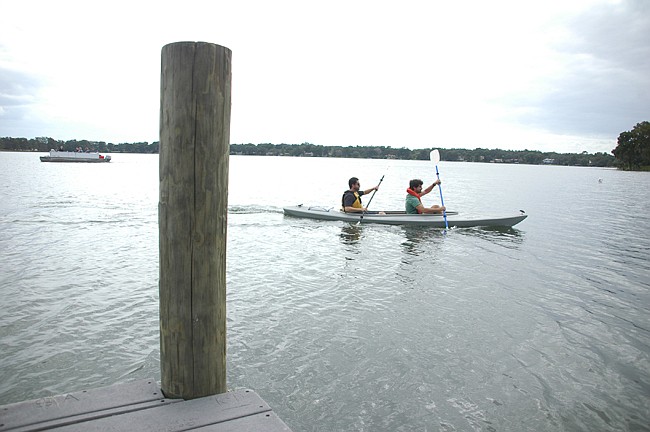- July 26, 2024
-
-
Loading

Loading

Future regulations on paddleboards and businesses using Winter Park’s chain of lakes came another step closer to fruition on Oct. 16 as members of the Winter Park Lakes and Waterways Advisory Board discussed their legal limitations with City Attorney Larry Brown.
Brown advised the board that they could put regulations and bans in place as long as they were regarding the safety of residents.
Members of the board agreed that an ongoing safety issue for paddleboarders required action.
“You look at this boat and that boat and then you turn back and all of the sudden there’s a paddleboarder out in front of you and you don’t know where they came from,” Board Chair Jesse Graham said. “There’ve been a couple times where I’ve just come to a dead stop because there’s five or six boats around me and I think ‘This is too dangerous, I’m stopping.’”
Brown told the board that the current code needs to be updated as well. An existing ordinance bans planes from landing on the city’s lakes, yet Lake Killarney continues to serve as a landing destination. The code hasn’t been addressed since the 1960s, before Lake Killarney was incorporated into the city.
The frequent use of Lake Killarney by kayakers and paddleboarders in combination with landing planes remains an issue that needs to be resolved, whether it’s the plane or the watercraft ordinance that’s eventually tightened up, Brown said.
“People who have a technical understanding should basically look at our lakes and say ‘What is a safe load?’” Brown said. “Can a certain lake accommodate 50 paddleboarders and 10 motor boats? Where are those limits? How do we want to handle what may be unsafe loads of activity?”
Other parts of the current code are in place, but aren’t regularly enforced.
“Your current code prohibits non-motorized watercraft from ever being in the canals and I understand that’s not enforced,” Brown said. “We need to make sure that your code comports with what everyone is happy to allow to occur.”
Board members understood that the city’s winding canal system continues to be a safety concern for paddleboarders and other non-motorized watercraft, despite the frequent use of them by guided tour businesses such as Paddleboard Orlando.
“I went through this weekend and we were coming through with the tour and there were about six boats trying to go the other way,” Graham said. “It was a log jam; packed in there were some kayakers and I think one guy on a paddleboard. It was a dangerous situation, somebody could have done something stupid and people would have gotten hurt.”
Board member Nora Miller agreed that paddleboards in a closed environment like the city’s canals are difficult to control.
“You can’t steer when you slow down,” Miller said. “When you have paddleboarders in the canals, it’s very dangerous.”
A discussion regarding businesses that use the city’s lakes began during the September Lakes and Waterways Advisory Board meeting. The new paddleboard store at the incoming Lakeside Winter Park development on Lake Killarney sparked concerns of too many paddleboarders entering the lakes at once.
Brown suggested that the lakes could be zoned in a way to prevent or limit commercial businesses from using certain lakes, whether it involves motorized or non-motorized watercraft.
“Certainly I can understand a greater need to either eliminate or severely restrict the numbers of commercial operations, because they’re the ones who might want to put 20 motorized things on the water,” Brown said. “That’s going to disturb the ambiance of the lake.”
Orange County in California passed their own regulations on paddleboards in 2010. The Orange Coast District’s Department of Parks and Recreation created an ordinance that bans paddleboarders from being within 100 feet of swimmers and forces them to take off from a designated area to paddle along beaches. Violators could be faced with fines adding up to $450.
A tax for residents or businesses using the lakes would also be an alternative to limit density, Brown said.
“To an extent, the lakes are becoming more and more in demand and they’re crowded,” Brown said. “There’s going to be increasing cost for regulation, and so those permit fees could legitimately cover that.”
The board plans to put together a proposed policy for regulation of the Winter Park’s lakes and waterways for Brown to review.